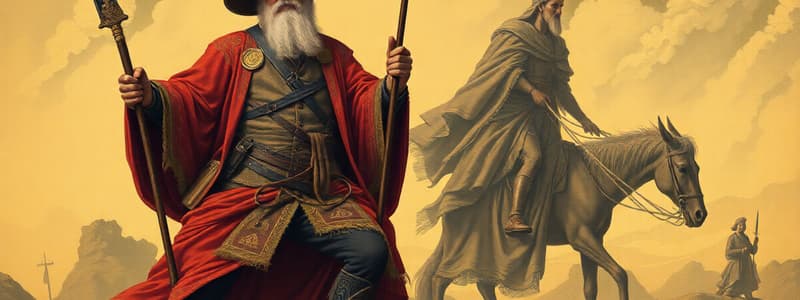Podcast
Questions and Answers
What impact did Stanley's experiences in the wilderness have on his character, according to his own reflections?
What impact did Stanley's experiences in the wilderness have on his character, according to his own reflections?
- They made him more selfish and ruthless.
- They turned him into a man of significant leisure.
- They contributed to his exceptional moral strength. (correct)
- They caused him to distrust other explorers.
How did public perception of Stanley shift over time?
How did public perception of Stanley shift over time?
- From a ruthless imperialist to a celebrated philanthropist.
- From an admired explorer to a forgotten figure.
- From a brash hero to a brutal exploiter. (correct)
- From an unknown figure to a universally admired explorer.
Which famous writer evaluated Stanley's accomplishments in comparison to his own life?
Which famous writer evaluated Stanley's accomplishments in comparison to his own life?
- Leo Tolstoy
- Mark Twain (correct)
- Anton Chekhov
- Charles Dickens
What did Tim Jeal contribute to the understanding of Stanley's character?
What did Tim Jeal contribute to the understanding of Stanley's character?
What difficulties did Stanley and his team face during their expedition through the Ituri rain forest?
What difficulties did Stanley and his team face during their expedition through the Ituri rain forest?
What was a major aspect of Stanley's upbringing that he tried to hide throughout his life?
What was a major aspect of Stanley's upbringing that he tried to hide throughout his life?
What did Stanley believe about the relationship between willpower and moral resistance?
What did Stanley believe about the relationship between willpower and moral resistance?
How did Stanley’s experiences in Africa change his perspective on human nature?
How did Stanley’s experiences in Africa change his perspective on human nature?
What psychological concept does Stanley's observations regarding willpower and temptation relate to?
What psychological concept does Stanley's observations regarding willpower and temptation relate to?
What actions did Stanley take at the age of eleven to demonstrate his self-control?
What actions did Stanley take at the age of eleven to demonstrate his self-control?
What disastrous actions did the leaders of the Rear Column partake in while Stanley was away?
What disastrous actions did the leaders of the Rear Column partake in while Stanley was away?
How did the British commander of the fort exercise his authority?
How did the British commander of the fort exercise his authority?
What happened to the young African women taken by the Rear Column?
What happened to the young African women taken by the Rear Column?
What act did one officer in the Rear Column commit involving an eleven-year-old girl?
What act did one officer in the Rear Column commit involving an eleven-year-old girl?
What insight did Joseph Conrad gain from Stanley's Rear Column before his own journey into the Congo?
What insight did Joseph Conrad gain from Stanley's Rear Column before his own journey into the Congo?
What strategy did Stanley use to conserve his willpower during his expedition?
What strategy did Stanley use to conserve his willpower during his expedition?
How did the researchers measure the difference in responses from the men regarding sexual behavior?
How did the researchers measure the difference in responses from the men regarding sexual behavior?
What is identified as a safer approach to resist temptation in comparison to relying on willpower?
What is identified as a safer approach to resist temptation in comparison to relying on willpower?
What physical condition did Stanley endure during his expedition that affected his mental state?
What physical condition did Stanley endure during his expedition that affected his mental state?
Which method did Odysseus use to ensure he did not succumb to the Sirens' temptations?
Which method did Odysseus use to ensure he did not succumb to the Sirens' temptations?
Flashcards
Stanley's Congo Expedition
Stanley's Congo Expedition
Henry Morton Stanley's 1887 expedition up the Congo River, which resulted in a deplorable act of cruelty by the Rear Column.
Rear Column
Rear Column
The part of Stanley's expedition left behind in a riverside camp to await supplies, which engaged in brutal atrocities.
Brutal Atrocities
Brutal Atrocities
Acts of extreme violence and cruelty against Africans by the Rear Column members and the fort's commander.
Loss of Control
Loss of Control
Signup and view all the flashcards
Sex Slavery
Sex Slavery
Signup and view all the flashcards
Savage Beatings
Savage Beatings
Signup and view all the flashcards
Cannibalistic Ritual
Cannibalistic Ritual
Signup and view all the flashcards
Imperialism's Impact
Imperialism's Impact
Signup and view all the flashcards
Stanley's expeditions
Stanley's expeditions
Signup and view all the flashcards
Ituri rainforest
Ituri rainforest
Signup and view all the flashcards
Expedition hardship
Expedition hardship
Signup and view all the flashcards
Stanley's resilience
Stanley's resilience
Signup and view all the flashcards
Bula Matari
Bula Matari
Signup and view all the flashcards
Stanley's schooling
Stanley's schooling
Signup and view all the flashcards
Public perception of Stanley
Public perception of Stanley
Signup and view all the flashcards
Changing views of Stanley
Changing views of Stanley
Signup and view all the flashcards
Modern revision of Stanley
Modern revision of Stanley
Signup and view all the flashcards
Jeal's contribution
Jeal's contribution
Signup and view all the flashcards
Empathy Gap
Empathy Gap
Signup and view all the flashcards
Stanley's Early Life
Stanley's Early Life
Signup and view all the flashcards
Stanley's Workhouse Experience
Stanley's Workhouse Experience
Signup and view all the flashcards
False Identity (Stanley)
False Identity (Stanley)
Signup and view all the flashcards
Fantasy Father's Advice
Fantasy Father's Advice
Signup and view all the flashcards
Self-Discipline Experimentation (Stanley)
Self-Discipline Experimentation (Stanley)
Signup and view all the flashcards
Hot-Cold Empathy Gap
Hot-Cold Empathy Gap
Signup and view all the flashcards
Africa's Impact on Self-Control
Africa's Impact on Self-Control
Signup and view all the flashcards
Loewenstein's "Hot-Cold Empathy Gap"
Loewenstein's "Hot-Cold Empathy Gap"
Signup and view all the flashcards
Commune Example
Commune Example
Signup and view all the flashcards
Willpower Conservation
Willpower Conservation
Signup and view all the flashcards
Precommitment
Precommitment
Signup and view all the flashcards
Hot-State Bias
Hot-State Bias
Signup and view all the flashcards
Cold-State Bias
Cold-State Bias
Signup and view all the flashcards
Public Persona
Public Persona
Signup and view all the flashcards
Mental Tricks
Mental Tricks
Signup and view all the flashcards
Unthinkably Disgraceful
Unthinkably Disgraceful
Signup and view all the flashcards
Pre-commitment Strategies
Pre-commitment Strategies
Signup and view all the flashcards
Social Media
Social Media
Signup and view all the flashcards
Study Notes
Henry Morton Stanley's African Expeditions
- Stanley's 1887 Congo River expedition inadvertently sparked a scandal due to the brutal actions of his Rear Column.
- The Rear Column, consisting of prominent British figures, engaged in widespread abuses against African people including: refusing medical treatment to sick natives, kidnapping and enslaving women, and inflicting extreme violence upon others, even employing mutilations and killings as punishment and intimidation.
- Critics condemned the expedition's conduct, marking it as a final one of its kind. Stanley himself condemned his men's actions.
Stanley's Personal Challenges and Accomplishments
- Stanley faced immense personal suffering and adversity in his African journeys.
- His expeditions involved navigating dense rain forests, enduring torrential rain, mud, insects, and starvation.
- He and his men suffered from disease, injuries, and death, with only about a third of his original expedition crew surviving.
- Stanley's resilience and determination in handling grueling conditions earned him the nickname "Bula Matari" (Breaker of Rocks) from the Africans who helped him.
- However, Stanley's leadership was marred by controversies after his Rear Column's conduct.
The "Heart of Darkness"
- Henry Morton Stanley's experience mirrored the cruelty and exploitation that impacted European colonialism on Africans.
- Stanley's actions, while heroic in public perception at the time, were increasingly viewed negatively by historians and biographers in later centuries as colonization and Victorian values declined.
- This later perception contrasted him with Dr. Livingstone.
The Revisionist View of Stanley
- Dr. Livingston's biographer Tim Jeal's research into Stanley's life, along with recent archival discoveries, changed the commonly held view of Stanley.
- Jeal's work depicts a more nuanced and complex Stanley, highlighting both his flaws and virtues.
- Stanley's self-control and resilience were viewed as even more remarkable considering his history and deep anxieties.
The Empathy Gap
- Stanley recognized and documented what modern psychologists call the "hot-cold empathy gap": the difficulty in anticipating one's behavior in stressful and tempting situations.
- He observed that individuals, in calmer environments, might have good intentions but struggle to maintain them under pressure and stress of the wilderness.
- The experience highlighted that the inability to empathize with one's behaviors under stress is a common struggle.
Willpower, Habits, and Self-Control
- Stanley understood that sustained willpower required precommitment - making it difficult or undesirable to act contrary to virtuous intentions.
- Orderly habits and routines, such as daily shaving, could improve self-control by triggering automatic responses, reducing the need for conscious effort in certain situations.
- Individuals with high self-control, studies show, are often those who have cultivated specific habits to assist them.
Precommitment Strategies
- Stanley used precommitment to overcome potential temptations.
- Public declarations, pre-arranged agreements, and external accountability, such as through social media or formal contracts, can maintain willpower in times of temptation.
- The "Public Humiliation Diet," commitment contracts, and external monitoring tools were presented as modern precommitment strategies.
The "Sacred Task" and High-Level Thinking
- Stanley's belief that he had a "sacred task" and his personal ambition likely helped maintain his resolve in challenging times.
- Mental focus on long-term goals and abstract values, rather than short-term impulses, contributed to self-control.
- His personal struggles were deeply related to the horrors he observed in Africa and the belief in fighting against the expansion of slavery.
Importance of Compassion and Empathy
- For Stanley, self-control wasn't just about personal strength, but also about showing empathy towards others.
- Self-control, enabled by empathy, allowed him to connect with his men and understand their struggles during harsh conditions, such as the Ituri jungle.
- Stanley's experiences in Africa demonstrated that effective self-discipline often requires understanding and compassion towards others and oneself.
Studying That Suits You
Use AI to generate personalized quizzes and flashcards to suit your learning preferences.




